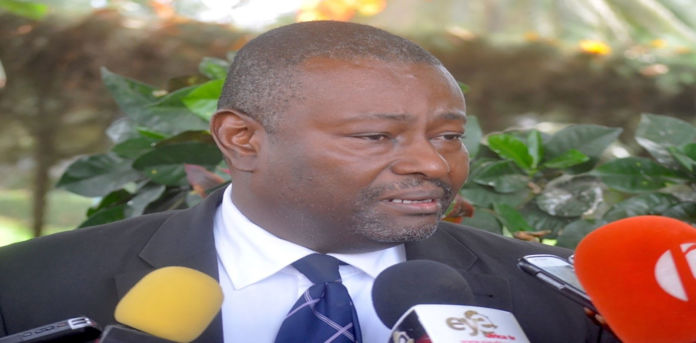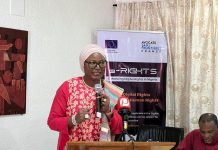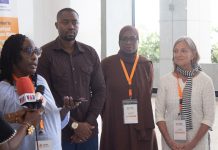- What is the NHRC of The Gambia and what does it do
The National Human Rights Commission (NHRC) is the National Human Rights Institution for The Gambia that was established by an Act of the National Assembly in 2017.
It is a permanent, independent body whose functions include the promotion and protection of human rights in The Gambia; monitoring, receiving, investigating and considering complaints of human rights violations in The Gambia; recommending appropriate remedial action to the Government; seeking appropriate redress on behalf of victims; increasing public awareness and education programs to promote a culture of human rights in The Gambia and assisting the Government in the formulation of appropriate policies to guarantee human rights.
The five Commissioners of the NHRC were officially sworn in by the President of the Republic of The Gambia on the 14 February 2019 following a consideration by a selection panel consisting of representative of 6 civil society umbrella associations and a final vetting by the National Assembly.
- What is the Motto of the NHRC?
Let Justice Guide Our Actions
- What is the Vision of the NHRC?
A Gambia where everyone enjoys human rights and freedom.
- What is the Mission of the NHRC?
The National Human Rights Commission together with the Government of The Gambia, the people of the Gambia, CSOs and international communities will promote and protect the fundamental human rights of all through monitoring, advocacy, awareness raising, capacity building and partnerships.
- What Are the NHRC Ten values?
- a) independence
- b) integrity
- c) impartiality
- d) equality
- e) respect for diversity and divergent views
- f) inclusivity
- g) transparency
- h) confidentiality
- i) accountability
- j) accessibility
- What are the powers of the NHRC?
The NHRC of The Gambia has the powers, rights and privileges vested in the High Court at trial. It receives and hears complaints from the public on human rights violations, recommends appropriate remedial actions to the Government and seeks appropriate remedial actions on behalf of victims.
The Commission can summon any person, official or authority to appear before it. Such individuals or authorities can be:
- a) Asked to testify as witnesses;
- b) Asked to produce any document or record that is needed as part of the Commission’s investigations;
- c) Asked questions that will assist in investigating human rights complaints or omissions and;
- d) Required to disclose any information that is relevant to the Commission’s investigations;
The Commission also has the power to investigate suspected cases of human rights violations and to report to the Government and all relevant institutions on any such investigations.
- Is the NHRC of The Gambia an independent institution and how independent is it?
Yes, the NHRC is an independent institution in line with the Paris Principles. Section 16 of the National Human Rights Commission Act also states:
‘In the performance of its functions, the Commission shall not be subject to the direction or control of any person or authority.’
In as much as the NHRC is independent, it:
- a) must act in accordance with the Constitution of The Gambia;
- b) must conduct its investigations in a transparent, fair and impartial manner; and
- c) must exercise its function without fear, favour or prejudice;
- d) although they are accountable to National Assembly for the efficient performance of their functions.
Section 9 of the National Human Rights Commission Act 2017 requires members of the Commission not to act in a partisan manner or be involved in a political party.
Sections 5 and 9 of the National Human Rights Commission Act 2017 provides for a transparent process of appointment and removal from office of Commissioners that ensures that they are independent and fully accountable in the execution of their mandate.
To ensure financial independence, Section 7 of National Human Rights Commission Act 2017 stipulates that the personal emoluments of the Commissioners shall not be varied ‘to the member’s disadvantage during his or her tenure of office’.
Section 10 of the National Human Rights Commission Act 2017 provides immunity to members of the Commission from civil or criminal proceedings or personal liability for any act done or not done in the performance of their functions
- Is the NHRC an NGO?
No, the NHRC is not a Non-Governmental Organization (NGO) but a State created independent institution. (refer to question 1)
- Where does the Commission get its funding?
The National Human Rights Commission of The Gambia, like all other National Human Rights Institutions the world over, is created by the State and thus gets it allocation from the national budget. However, it can also receive funding support from development partners such as the UN Agencies, European Union, African Union and others in so far as donations and gifts made to the Commission are not inconsistent with its functions or other enactment of the National Assembly.
The Commission may also levy fees, charges and other moneys or properties which may become payable to or vest in the Commission in respect of the performance of its functions.
- What selection criteria does the Commission use when taking up cases for investigation? For what grievances can I approach the NHRC?
The Commission receives complaints of human rights violations. So any case categorized as such can be handled by the Commission. A human rights violation is a breach or infringement of any right provided for in the Constitution or any international human rights legal instrument agreement which The Gambia is party to or has ratified.
However, according to the NHRC Act 2017, the Commission cannot investigate human rights violations that occurred before 24 January 2017 unless they are continuing violations.
- Can the NHRC represent me in court?
No, the NHRC does not act as legal counsel or legal practitioner for complainants. It does not provide legal representation services since it has an independent oversight role over human rights matters. Complainants requiring legal representation services for personal matters are referred to the National Agency for Legal Aid and other Civil Society Organizations, such as Female Lawyers Association-Gambia and the Gambia Bar Association, which offer such services.
- What happens after the Commission makes recommendations on cases received and investigated?
The Commission will:
- a) provide feedback to the complainants e.g. advising them on the appropriate course of action to take, including seeking redress in a court of law;
- b) communicate its decision to the Government and all relevant institutions and individuals to take the necessary corrective action, and
- c) seek appropriate redress on behalf of complainants.
- Can the Commission access Government offices or information and detention centers without restriction in the course of its investigation?
The Commission has access rights, when it is investigating human rights violations, to all Government offices, Government facilities, places of detention and all non-classified information in Government documents.
However, if a Government official thinks that certain information cannot be publicly disclosed due to national security or its sensitive and confidential nature, he or she will have to explain the reasons before the Commission.
- Is there any protection for an Informant?
A person who discloses or reports a human rights violation to the Commission, known as an ‘informant’, is protected against civil or criminal prosecution.
If the Commission is convinced that the informant or his or her property could be harmed, it can direct any institution, such as the Gambia Police Force, to protect the informant or his or her property.
- Is there any protection for a Witness?
A person who testifies about a human rights violation before the Commission, known as a ‘witness’, is protected against civil or criminal prosecution.
If the Commission is convinced that the witness or his or her property could be harmed, it can direct any institution, such as the Gambia Police Force, to protect the witness or his or her property.
- Is the NHRC in all the regions of The Gambia?
The Commission is not yet decentralized. Currently, its main office is situated at Kotu in the Brikama Municipality. There are plans afoot to have Memorandum of Understanding with relevant Government agencies in the regions and CSOs/ NGOs who could register complaints of human rights on its behalf and pass them to the Commission for appropriate action. People who want to register complaints can come directly to the Office of the National Human Rights Commission alternatively also visit the Commission’s website (to be developed very soon) and fill out the Complaint Register Form.
ACTIVITIES:
Recognizing the fundamentally important role of law enforcement officials in protecting and respecting human rights, police Officers are expected to have a good understanding of international, regional and domestic human rights frameworks and standards.
It is in this vein that the NHRC in collaboration with the UNDP is organizing a series of training workshops for Police Officers with the main objective of strengthening their knowledge and understanding of human rights the first one taking place from Monday 2nd to Wednesday 4th September 2019 at the Baobab Holiday Resort in Bijilo commencing at 09:00 am daily.
Pursuant to the mandate conferred on the NHRC by the National Human Rights Commission Act 2017, the NHRC conducted a 3 days training workshop for 30 representatives of Civil Society Organizations in The Gambia with a view to discuss the establishment, mandate (powers and functions) of the NHRC with Civil Society Organizations who are very crucial in the work of the NHRC as well as to train them on very pertinent human rights themes in order to build their capacity and ensure effective collaboration and partnership as the NHRC begin its gigantic task of nurturing a culture of human rights in The Gambia. The workshop was conducted from Tuesday 20 to Thursday 22 August 2019 at the Baobab Holiday Resort in Bijilo commencing at 09:00 am daily.



















